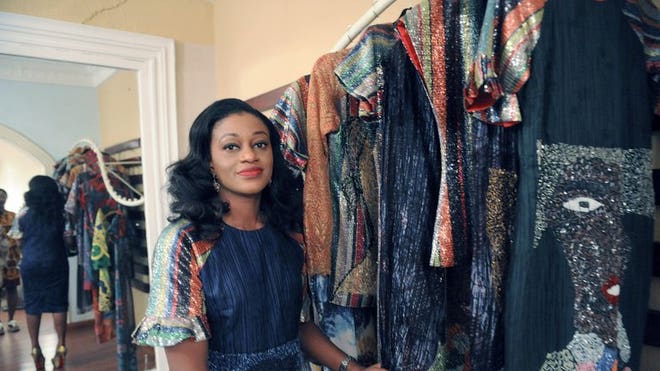Nigeria boutiques creating Lagos fashion hub
-
Shoppers ready to spend lavishly on clothes by elite designers sip champagne in a discreetly located store that only those in-the-know know exists.

Perhaps it's not an unusual scene in Manhattan or Milan, but in Lagos, sub-Saharan Africa's largest city, shops like Temple Muse are a novelty. A growing number of boutique owners and fashion designers however are working to change that.
Most of Nigeria's roughly 160 million people live in extreme poverty, but the upper class here number among the wealthiest in Africa, including those who have profited from the continent's largest oil industry.
Nigerians' sense of style is also well-known, and the country boasts several fashion designers who have made their mark internationally.
Just ask Michelle Obama, who wore a blouse by Nigeria's Maki Oh on a recent trip to South Africa.
Or take the Wadhwani brothers, who are Indian but were raised in Lagos. They saw there was a gap in the city's luxury market.
The brothers opened a store that aims to serve Nigeria's ultra-high-end shoppers who typically hop on planes to Europe when their wardrobes need an upgrade.
"I found a niche in the market," said Avinash Wadhwani, co-owner of Temple Muse boutique in the posh Victoria Island neighbourhood of Lagos.
He previously worked as a buyer for the London department store Selfridges, learning first-hand the appeal of Europe's top fashion lines. But he insisted Nigeria's rich are also seeking a local look.
Some Nigerians "travel by plane every other week and shop in the best boutiques around the globe, but they still have that sense of pride and everyone wants something from (their) own heritage," he said.
Temple Muse, which opened five years ago, is protected from the hectic mega-city outside by a thick metal door and is equipped with a champagne bar and a cafe. Some garments come with pricetags of $3,000 (2,300 euros), and there are fashion mavens ready to snap up several of them.
Odun Ogunbiyi, a customer who claimed plenty of foreign shopping experience, told AFP the outfits she buys in Nigeria are admired wherever she goes.
"I travel a lot. I go to Miami, I go to London to visit friends and family. and they ask me 'where did you get that from?'," said Ogunbiyi, a TV host.
When she tells people the outfit is Nigerian, they say they "can't believe it," she said.
"It's gotten to the point where we are on standard with international brands, which is great!"
Wadhwani agreed that Nigerian designers are becoming increasingly respected abroad.
The US First Lady's recent appearance in a Maki Oh blouse was seen as evidence of growing exposure for designers here.
But Wadhwani knows that his local clients also want to wear premium European names, so he stocks the embroidered dresses of Nigerian designer Lanre Da Silva Ajayi alongside Givenchy and Italy's Emilio Pucci.
Tope Edu is another fashion seller hoping that wealthy Nigerians will shop more in Lagos. She manages the Ermenegildo Zegna store on Victoria Island, the Italian line's first and only outlet in sub-Saharan Africa, which opened in April.
But in a reminder of the perils of doing business in Nigeria, Edu said it took seven years to get the luxury franchise opened.
Zegna first needed to be sure that there was a consumer base to support the store but faced a lack of reliable consumer data.
A series of made-to-measure Zegna events were successful, giving confidence that a full-time ready-to-wear store could survive.
Company chief executive Gildo Zegna also had faith in the buying power of Africa's super-rich.
He told the Financial Times that customers from the continent on average spent 50 percent more in Zegna's stores than buyers from other regions.
The next challenge was the venue and ensuring, as Edu explained, that the Lagos "Zegna store looked exactly like a Zegna store elsewhere in the world."
"It's a very difficult process," she conceded, citing Nigeria's nightmarish bureaucracy.
The stand-alone shop is on a street lined with office buildings which hardly offers the majestic surroundings of Paris's Champs-Elysees but inside business appears to be thriving.
Especially on smart-casual items like polo shirts, which are being scooped up at just under $500 each, Edu told AFP.
She debunked the notion that Nigeria's elite are committed to exclusively shopping abroad.
"Once (they) know it's available, I think that same customer will purchase from here," she said.
Like Zegna, Folake Folarin-Cocker has growing faith in the Nigerian and wider African market.
Her Tiffany Amber line, launched in 1998 and Nigeria's first ready-to-wear brand, has four standalone stores in the country.
Her designs are also sold in Ghana and South Africa, and will soon be available in oil-rich Angola.
Shoppers in Milan and London can also buy Tiffany Amber items, but for Folarin-Cocker, the European and US markets are mainly for publicity.
Those markets "are saturated. Africa is untapped," she said.
While her work is currently priced at luxury rates, she is preparing a lower cost line because she believes the continent is craving an accessible, ready-to-wear brand.
An H&M or "Zara with an African accent," she explained, referring to popular European clothes shops.
Like the owners and shoppers at Temple Muse, Folarin-Cocker takes pride in the growing respect and exposure being given to Nigerian designers and said that talent in the fashion industry can help change perceptions of the continent.
"Fashion is one of the ways we are going to be able to rebrand Africa," she said. "It's not 'We Are The World, We Are the Children' anymore."




